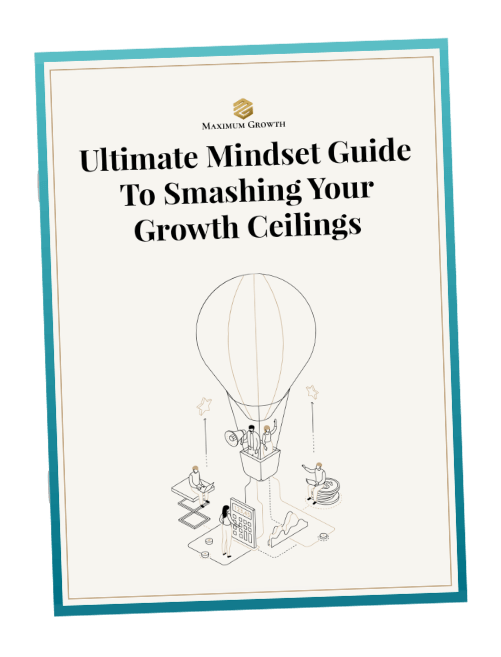One thing that is clear in my mind is that I was not prepared for life. At 18, I moved two states away from my family and lacked an understanding of what adulting was all about.
Shortly after venturing out into the world on my own, I was in the kitchen with some eggs in hand, water on the stove, and had no idea what to do (pre Google days peeps!). I rang my sister, “Tash, how do I boil an egg?”
(yes, I hang my head in shame. . .)
If I couldn’t even feed myself, how the hell was I supposed to manage my money, let alone grow it?
Yes, I left school and transitioned into the school of hard knocks (and some severe uppercuts). It wasn’t long before I had no income, no money in my account and was going to the Salvation Army for food and essentials to survive.
My thoughts were a hand to mouth money mindset and having a millionaire mindset didn’t even cross my mind.
It wasn’t until I read the One Minute Millionaire, and aimed to be a millionaire, that it destroyed my finances. Let me explain {first_name}.
You might be surprised to know that many people who have earned millions of dollars during their entire working life end up spending all their money and have very little savings. Some have chosen a lifestyle now over savings for the future.
Let’s break it down;
WHAT’S YOUR Growth Ceiling?
Growth Ceiling Definition: Invisible barriers, challenges and problems preventing you from levelling up
Fact: All business problems are personal problems in disguise
Take Our Maximum Growth Quiz To Identify Your Growth Ceiling:
If you earned, on average, $100,000 per year over a 30-year period, that’s $3,000,000. And that is being conservative, as most people earn more money every year, and their income tends to rise as their level of expertise grows.
If you started with $100,000 in savings and added $10,000 to saving each year, with a 6% return over 30 years, you’re looking at $1,467,038.
See, a millionaire’s mindset destroys your financial future.
Millionaire status is easy to achieve and with little risk and investing. And you set the bar too low.
I, like many other people, was never taught how to think about money, nor even believe what could be possible.
Currently in Australia,
More than average wealth looks like this:
Median net worth: $558,800
Money in the bank: $30,800
Value of shares: $3800
Value of private trust: $1,300
Value of super fund: $112,900
Average Weekly Income Before-tax: $2,216
Less than average wealth
Median net worth: $31,500
Money in the bank: $6,500
Value of shares: N/A
Value of private trust: N/A
Value of super fund: $17,200
Average Weekly Income Before-tax: $1,260
Geek out here or if you want a broader view according to your own generation, check this out.
This isn’t to get comparisonitis {first_name}, it is to see it is collective thinking about money that influences people’s net worth. And something has to change.
And change has to start within you first.
So here are my top three tips to apply today to help you to shift your money mindset;
- You can earn all the money in the world, but if you don’t believe you deserve it, you ain’t keeping it, my friend. Deserve isn’t something you spontaneously feel or don’t feel, it can be created by shifting your internal thinking. So let’s start with a dirty laundry list. Make a long list of everything you feel shameful or guilty about, either what you have done or not done, whether it is public or private. When you have the list, start working away on this by asking yourself the Demartini Method question in Column 10 and Column 14, which is about the benefits of what happened to you and others (column 10), and the drawbacks to you and others if it had been the opposite way (column 14). An example is me finding the benefits to myself of not knowing how to cook an egg at 18, and the drawbacks if I did know to dissolve the shame and love myself for what I didn’t know. It is powerful to appreciate what happened and dissolve your misperceptions. As you dissolve shame and guilt, you’ll notice an increase in your deserve levels.
- Most financial experts recommend saving up to six months worth of living expenses in a savings account in case you need it immediately to take care of a job loss or other emergency. In addition to an emergency fund, this doesn’t include setting aside the money you may need to send your children to university or college, holidays or medical expenses. Create a separate account for your emergency fund so that you have security if something happens, you can ride it out. The benefit in your mind is that you aren’t stressed about money and live week to week, but have a cushion behind you just in case you fall (your butt will thank you for the soft landing when you’ve kicked your butt into gear and saved this money).
- Now, let’s get down to business, it’s time for you to awaken the light within and set a stretch goal for your finances. Think about what you’d love to achieve in a lifetime, and stretch it, make it uncomfortable but not unbelievable. And come back every year and adjust it accordingly.
Believe. Conceive. Achieve.
It starts on the inside of you {first_name}.
And remember, you’re born to live up to the light within you. And maybe that is bigger than you ever thought possible.
See you on the inside,
Leadership Coach
Counsellor & Master Certified Demartini Method Facilitator
Maximum Growth: Private & Group Coaching Available


